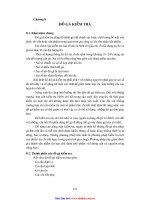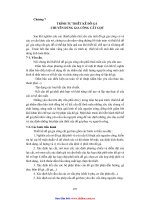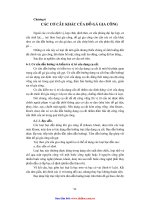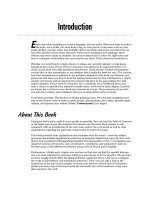Giáo trình động từ tiếng Pháp - Part V Considering Your Mood: Subjunctive or Not - Chapter 19 ppt
Bạn đang xem bản rút gọn của tài liệu. Xem và tải ngay bản đầy đủ của tài liệu tại đây (298.18 KB, 14 trang )
Part V
Considering Your Mood:
Subjunctive or Not
26_773883 pt05.qxp 7/28/06 8:50 PM Page 209
In this part . . .
T
he mood of a verb indicates the writer or speaker’s
point of view regarding the events. The indicative —
including the present, past, and future — expresses facts
as well as objective observations. It expresses what is
happening, has happened, or will happen. Meanwhile the
subjunctive mood expresses what you want to happen,
command to happen, or doubt will happen. Chapter 19
looks at conjugating the present subjunctive, Chapter 20
focuses on using the present subjunctive, and Chapter 21
shows you how to conjugate and use the past subjunctive.
26_773883 pt05.qxp 7/28/06 8:50 PM Page 210
Chapter 19
Creating the Present Subjunctive
In This Chapter
ᮣ Working with regular verbs
ᮣ Forming the subjunctive with “irregular” verbs
ᮣ Taking a stab with stem changers
ᮣ Trying out true irregular verbs
U
nlike the indicative mood, which expresses an objective reality, the subjunctive mood
expresses the speaker’s or writer’s subjective points of view, emotions, fears, and
doubts. To use the subjunctive, you place it in the subordinate clause introduced by
que
(that) when a verb or verbal expression in the main clause expresses emotion, will, wish,
command, doubt, or subjectivity. When the verb in the main clause expresses a fact or an
objective observation, then you use the indicative instead of the subjunctive.
This chapter looks at how you conjugate good ol’ regular verbs, verbs that are irregular in
other tenses but regular in the subjunctive, stem-changing verbs, and true irregular verbs.
After you know how to form the present subjunctive, you can check out Chapter 20, which
shows you how to
use the present subjunctive. Because French doesn’t have a future sub-
junctive, the present subjunctive expresses the future as well as the present and can be
translated in English in the tense that makes the most sense.
Forming the Present Subjunctive
with Regular Verbs
The subjunctive isn’t a difficult tense to form. All you need is to be familiar with the present
indicative conjugation of the verbs be they regular verbs, spelling-change verbs, or even
some irregular verbs. (Check out Chapters 2, 3, and 4 for the present indicative of verbs.)
In this section, I start off with forming the present subjunctive of regular verbs.
You form the present subjunctive the same way, whether the verb is regular or not and
whether it has a stem change or not. To form the present subjunctive, start from the third
person plural of the indicative, the
ils/elles form, drop the -ent to form the stem, and add
the following endings:
-e, -es, -e, -ions, -iez, or -ent.
Present Subjunctive Verb Endings
je -e nous -ions
tu -es vous -iez
il/elle/on -e ils/elles -ent
27_773883 ch19.qxp 8/2/06 1:40 PM Page 211
The verbs parler (to speak), finir (to finish), and vendre (to sell) serve as examples of
the three categories of regular verbs. You create the stem for each with the
ils/elles
form of the indicative, like so:
ߜ Parler (to speak) becomes ils/elles parlent in the third person plural indicative.
Delete the
-ent from this form to create the stem, and you get parl
ߜ Finir (to finish) becomes ils/elles finissent in the third person plural indicative.
Delete the
-ent from this form to create the stem, and you get finiss
ߜ Vendre (to sell) becomes ils/elles vendent in the third person plural indicative.
Delete the
-ent from this form to create the stem, and you get vend
parler (
to speak
)
que je parle que nous parlions
que tu parles que vous parliez
qu’il/elle/on parle qu’ils/elles parlent
Il est essentiel que nous parlions au directeur. (
It is essential that we speak to the director.
)
finir (
to finish
)
que je finisse que nous finissions
que tu finisses que vous finissiez
qu’il/elle/on finisse qui’ils/elles finissent
Il est possible que je finisse à 5 heures. (
It’s possible that I will finish at 5 o’clock.
)
vendre (
to sell
)
que je vende que nous vendions
que tu vendes que vous vendiez
qu’il/elle/on vende qu’ils/elles vendent
Mes parents veulent que je vende ma voiture. (
My parents want me to sell my car.
)
Il doute que je nous arrivions avant midi. (He doubts that we will arrive before
noon.
)
Nous sommes surpris que tu vendes ta maison. (We are surprised that you are selling
your house.
)
As strange as it looks and sounds, you do add the extra -
i to regular verbs whose
nous form already ends in -ions and vous form already ends in -iez in the present
indicative. These verbs include
étudier (to study), rire (to laugh), and sourire (to
smile
). I conjugate étudier in the following table. The stem (from ils étudient, the
third person plural indicative) is
étudi
212
Part V: Considering Your Mood: Subjunctive or Not
27_773883 ch19.qxp 8/2/06 1:40 PM Page 212
étudier (
to study
)
que j’étudie que nous étudiions
que tu étudies que vous étudiiez
qu’il/elle/on étudie qu’ils/elles étudient
Il est important que nous étudiions. (
It is important that we study.
)
Now take time to conjugate the following regular verbs into the present subjunctive.
Q. Il faut que nous _________________ (regarder) les nouvelles.
A. Il faut que nous regardions les nouvelles. (It is necessary that we watch the news.)
1. Mon professeur exige que je _________________ (choisir) un sujet de thèse.
2. Je suis ravi que tu _________________ (aimer) mon cadeau.
3. Nous sommes heureux qu’ils _________________ (réussir) à l’école.
4. Il est regrettable que nous _________________ (ne pas habiter) plus près de la ville.
5. Il faut qu’elle _________________ (rendre) les CD.
6. Ils sont surpris que je _________________ (chanter) bien.
7. Il est étonnant que les enfants _________________ (grandir) si vite.
8. Tu ne crois pas que le train _________________ (arriver) à l’heure?
9. Maman veut que nous _________________ (obéir) à nos grands-parents.
10. Il est dommage que tu _________________ (perdre) patience.
Typically Irregular, but Regular
in the Subjunctive
Most irregular verbs follow the same pattern in the subjunctive as the regular verbs.
You simply take their third person plural form (
ils/elles) and add the same endings:
-e, -es, -e, -ions, -iez, and -ent.
Check out Table 19-1 as an example of several irregular verbs that follow the regular
conjugation in the present subjunctive.
213
Chapter 19: Creating the Present Subjunctive
27_773883 ch19.qxp 8/2/06 1:40 PM Page 213
Table 19-1 Typically Irregular Verbs but Regular
in the Subjunctive
Infinitive Ils Form in the Present Indicative Subjunctive Stem
conduire (
to drive
) ils conduisent conduis-
connaître (
to know
) ils connaissent connaiss-
craindre (
to fear
) ils craignent craign-
dire (
to say
) ils disent dis-
dormir (
to sleep
) ils dorment dorm-
écrire (
to write
) ils écrivent écriv-
lire (
to read
) ils lisent lis-
mettre (
to put, to place
) ils mettent mett
offrir (
to offer
) ils offrent offr-
partir (
to leave
) ils partent part-
servir (
to serve
) ils servent serv-
sortir (
to go out
) ils sortent sort-
suivre
(
to follow, to
ils suivent suiv-
take a course
)
vivre (
to live
) ils vivent viv-
Il est important que les enfants lisent tous les jours. (It is important that children
read every day.
)
Conjugate the following verbs in parentheses in the present subjunctive.
Q. Je doute qu’elle _________________ (dire) des mensonges.
A. Je doute qu’elle dise des mensonges. (I doubt that she’s telling lies.)
11. Mes parents sont inquiets que je _________________ (craindre) les ascenseurs.
12. Eric est fâché que ses amis _________________ (partir) en vacances sans lui.
13. Il est important que nous _________________ (vivre) en paix.
14. Je veux que tu _________________ (mettre) ta ceinture de sécurité.
15. Il est nécessaire que tous les étudiants _________________ (suivre) cinq cours par
semestre.
16. Il est essentiel que nous _________________ (dormir) bien.
17. Croyez-vous que ce journaliste _________________ (écrire) bien?
18. Il est douteux qu’ils _________________ (servir) du vin.
19. Je suis surpris que vous _________________ (connaître) mon oncle.
20. Papa n’aime pas que nous _________________ (sortir) si tard.
214
Part V: Considering Your Mood: Subjunctive or Not
27_773883 ch19.qxp 8/2/06 1:40 PM Page 214
Looking At Stem Changers
Certain verbs in French have one stem for all the singular and third person plural sub-
jects and another stem for the
nous and vous forms. These verbs are often referred to
as
boot verbs because when you draw around the subject pronouns, the singular and
third person plural form the shape of a boot, whereas the
nous and vous forms are
left outside of the boot. Remember that these verbs have the same stem changes in
the present indicative as well as the present subjunctive.
Certain verbs have two different stems: one for the singular (
je, tu, il/elle/on) and
third person plural (
ils/elles) and another for the nous and vous forms. The stem of
the subjunctive form of these verbs is also derived from the third person plural
ils/
elles,
and the endings are the same as the regular verbs in the subjunctive (see
“Forming the Present Subjunctive with Regular Verbs” earlier in this chapter). The
way to remember these verbs is to refer to their present indicative, where they also
have this type of stem difference.
Check out the following examples that conjugate
boire (to drink) in both the present
indicative and the present subjunctive so that you can compare them.
boire (
to drink
) in the present indicative
je bois nous buvons
tu bois vous buvez
il/elle/on boit ils/elles boivent
Nous buvons beaucoup de lait. (
We drink a lot of milk.
)
boire (
to drink
) in the present subjunctive
que je boive que nous buvions
que tu boives que vous buviez
qu’il/elle/on boive qu’ils/elles boivent
Il est bon que nous buvions beaucoup de lait. (
It is good that we drink a lot of milk.
)
The following verbs also have two stems, just like boire. Prendre (to take) (and all its
compounds) forms its stem from the present indicative of the
ils form, ils prennent.
Delete the -ent and use prenn- as the stem for the je, tu, il/elle/on, and ils/elles forms.
Use
pren- for nous and vous.
prendre (
to take
)
que je prenne que nous prenions
que tu prennes que vous preniez
qu’il/elle/on prenne qu’ils/elles prennent
Il est nécessaire que tu prennes ton passeport. (
It is necessary that you take your passport.
)
215
Chapter 19: Creating the Present Subjunctive
27_773883 ch19.qxp 8/2/06 1:40 PM Page 215
You conjugate the following verbs just like prendre: apprendre (to learn), compren-
dre
(to understand), entreprendre (to undertake), reprendre (to retake, to resume),
and
surprendre (to surprise).
Another verb that has a stem change in the present subjunctive is
venir (to come).
I conjugate it in the following example, using the stem
vienn- from ils viennent, the
present indicative, for the
je, tu, il/elle/on, and ils/elles forms. Use ven- for nous and
vous.
venir (
to come
)
que je vienne que nous venions
que tu viennes que vous veniez
qu’il/elle/on vienne qu’ils/elles viennent
Nous sommes heureux que vous veniez. (
We are happy that you’re coming.
)
All compounds of venir are conjugated the same way. These include devenir (to
become
), intervenir (to intervene), parvenir (to reach, to succeed), revenir (to return),
and
se souvenir (to remember). Also, you conjugate similar verbs, like tenir (to hold)
and its compounds, the same way. These include
appartenir (to belong), contenir (to
contain
), maintenir (to maintain), obtenir (to obtain), retenir (to retain), and soutenir
(to support).
Recevoir (to receive) is another verb that has a stem change in the present subjunctive.
Its stems include
reçoiv- for the je, tu, il/elle/on, and ils/elles forms and recev- for
nous and vous.
recevoir (
to receive
)
que je reçoive que nous recevions
que tu reçoives que vous receviez
qu’il/elle/on reçoive qu’ils/elles reçoivent
Il est possible qu’ils reçoivent la coupe. (
It is possible that they receive the cup.
)
Verbs that are conjugated like recevoir include apercevoir (to see, to notice), concevoir
(to conceive), décevoir (to disappoint), and percevoir (to perceive, to comprehend).
Another verb that has a stem change in the present subjunctive is
croire (to believe).
Check out the following example that conjugates it. Remember that the stem for
je,
tu, il/elle/on,
and ils/elles forms is croi- and for the nous and vous forms croy
croire (
to believe
)
que je croie que nous croyions
que tu croies que vous croyiez
qu’il/elle/on croie qu’ils/elles croient
Je doute qu’elle croie tout ce qu’il dit. (
I doubt that she believes all he says.
)
Voir (to see) is conjugated like croire.
216
Part V: Considering Your Mood: Subjunctive or Not
27_773883 ch19.qxp 8/2/06 1:40 PM Page 216
Another verb that has a stem change in the present subjunctive is devoir (to owe, to
have to
). Check out the following example to conjugate it. Stems of this verb are doiv-
for the je, tu, il/elle/on, and ils/elles forms and dev- for nous and vous.
devoir (
ought to, must, to owe
)
que je doive que nous devions
que tu doives que vous deviez
qu’il/elle/on doive qu’ils/elles doivent
Je ne crois pas que tu doives payer maintenant. (
I don’t believe that you have to pay now.
)
All verbs ending in -yer are two-stem verbs as well. Like all the verbs that I’ve men-
tioned in this section thus far, the subjunctive tense is derived from the
ils form of the
present indicative. However, with the two-stem verbs, the
nous and vous forms have
a different stem. The verb
essayer (to try) serves as an example. The stems for this
verb are as follows:
essai- for the je, tu, il/elle/on, and ils/elles forms and essay- for
nous and vous.
essayer (
to try
)
que j’essaie que nous essayions
que tu essaies que vous essayiez
qu’il/elle/on essaie qu’ils/elles essaient
Je veux que tu essaies de venir. (
I want you to try to come.
)
Try conjugating some of these verbs. Follow the example and put the infinitives in the
third person plural indicative (
ils/elles) and then in the subjunctive of the indicated
subject pronouns.
Q. Infinitive: vivre
Present indicative: ils _________________
Present subjunctive: que tu _________________, que vous _________________
A. ils vivent, que tu vives, que vous viviez
21. Infinitive: apercevoir
Present indicative: ils _________________
Present subjunctive: que je _________________, qu’ils _________________
22. Infinitive: nettoyer
Present indicative: ils _________________
Present subjunctive: qu’il _________________, que nous _________________
217
Chapter 19: Creating the Present Subjunctive
27_773883 ch19.qxp 8/2/06 1:40 PM Page 217
23. Infinitive: venir
Present indicative: ils _________________
Present subjunctive: que tu _________________, qu’elle _________________
24. Infinitive: prendre
Present indicative: ils _________________
Present subjunctive: qu’il _________________, que vous _________________
25. Infinitive: se souvenir
Present indicative: ils _________________
Present subjunctive: que je _________________, que nous _________________
26. Infinitive: essayer
Present indicative: ils _________________
Present subjunctive: que tu _________________, que nous _________________
27. Infinitive: boire
Present indicative: ils _________________
Present subjunctive: qu’elle _________________, que vous _________________
28. Infinitive: voir
Present indicative: ils _________________
Present subjunctive: que je _________________, qu’elles _________________
29. Infinitive: apprendre
Present indicative: ils _________________
Present subjunctive: qu’il _________________, que nous _________________
30. Infinitive: devoir
Present indicative: ils _________________
Present subjunctive: que je _________________, que vous _________________
Eyeing the Irregulars
Some verbs are completely irregular in the present subjunctive. The stem of the subjunc-
tive isn’t derived from the third person plural (
ils/elles) the way the rest of the verbs’
stems are. However, even these irregular verbs have the same endings in the subjunc-
tive as the regular verbs: -e, -es, -e, -ions, -iez, and -ent. Check out the following verbs:
218
Part V: Considering Your Mood: Subjunctive or Not
27_773883 ch19.qxp 8/2/06 1:40 PM Page 218
aller (
to go
)
que j’aille que nous allions
que tu ailles que vous alliez
qu’il/elle/on aille qu’ils/elles aillent
Il faut que j’aille au magasin. (
I have to go to the store.
)
faire (
to do, to make
)
que je fasse que nous fassions
que tu fasses que vous fassiez
qu’il/elle/on fasse qu’ils/elles fassent
Je préfère que tu fasses la vaisselle. (
I prefer that you do the dishes.
)
pouvoir (
to be able to
)
que je puisse que nous puissions
que tu puisses que vous puissiez
qu’il/elle/on puisse qu’ils/elles puissent
Nous sommes contents qu’ils puissent venir. (
We are happy that they can come.
)
savoir (
to know
)
que je sache que nous sachions
que tu saches que vous sachiez
qu’il/elle/on sache qu’ils/elles sachent
Il est important que tu saches conduire. (
It’s important that you know how to drive.
)
vouloir (
to want
)
que je veuille que nous voulions
que tu veuilles que vous vouliez
qu’il/elle/on veuille qu’ils/elles veuillent
C’est impressionnant qu’elle veuille piloter un avion.
(
It is impressive that she wants to pilot a plane.
)
French has only two irregular verbs that don’t have the same endings in the subjunc-
tive as all other verbs. Can you guess which ones? Yes, you’re right if you guessed
avoir (to have) and être (to be).
219
Chapter 19: Creating the Present Subjunctive
27_773883 ch19.qxp 8/2/06 1:40 PM Page 219
avoir (
to have
)
que j’aie que nous ayons
que tu aies que vous ayez
qu’il/elle/on ait qu’ils/elles aient
Il est nécessaire que nous ayons de la patience. (
It is necessary that we have patience.
)
être (
to be
)
que je sois que nous soyons
que tu sois que vous soyez
qu’il/elle/on soit qu’ils/elles soient
Les parents veulent que leurs enfants soient sages.
(
The parents want their children to behave.
)
The following two verbs exist only in the third person singular, the il form: pleuvoir
(to rain) and falloir (to be necessary).
ߜ qu’il pleuve (that it rains/will rain)
ߜ qu’il faille (that it is/will be necessary)
Follow the example and put the infinitives of the irregular verbs in parentheses in the
subjunctive of the indicated subject pronoun.
Q. Faire: que tu _________________, qu’ils _________________
A. que tu fasses, qu’ils fassent
31.
Pouvoir: que je _________________, que nous _________________
32. Être: qu’elle _________________, que vous _________________
33. Vouloir: que tu _________________, qu’elles _________________
34. Savoir: qu’on _________________, que nous _________________
35. Avoir: que j’_________________, que vous _________________
36. Faire: qu’il _________________, que nous _________________
37. Pouvoir: que tu _________________, qu’ils _________________
38. Être: que je _________________, qu’elles _________________
39. Vouloir: que je _________________, que nous _________________
40. Faire: que tu _________________, qu’elles _________________
220
Part V: Considering Your Mood: Subjunctive or Not
27_773883 ch19.qxp 8/2/06 1:40 PM Page 220
221
Chapter 19: Creating the Present Subjunctive
Answer Key
This section contains the answers to the exercises that you encounter in this chapter.
Review your answers and compare them to the correct ones. Keep in mind that the
present subjunctive can also express the future as well as the present because there
is no future subjunctive.
a
Mon professeur exige que je choisisse un sujet de thèse. (My professor requires that I choose a
thesis topic.
)
b
Je suis ravi que tu aimes mon cadeau. (I am delighted that you like my gift.)
c
Nous sommes heureux qu’ils réussissent à l’école. (We are happy that they succeed/are
succeeding in school.
)
d
Il est regrettable que nous n’habitions pas plus près de la ville. (It is regrettable that we don’t
live closer to the city.
)
e
Il faut qu’elle rende les CD. (It is necessary that she give back the CDs.)
f
Ils sont surpris que je chante bien. (They are surprised that I sing well.)
g
Il est étonnant que les enfants grandissent si vite. (It is surprising that the children grow up
so fast.
)
h
Tu ne crois pas que le train arrive à l’heure? (You don’t believe that the train is arriving on time?)
i
Maman veut que nous obéissions à nos grands-parents. (Mom wants us to obey our
grandparents.
)
j
Il est dommage que tu perdes patience. (It is too bad that you lose/are losing patience.)
k
Mes parents sont inquiets que je craigne les ascenseurs. (My parents are worried that I fear
elevators.
)
l
Eric est fâché que ses amis partent en vacances sans lui. (Eric is angry that his friends are leav-
ing for vacation without him.
)
m
Il est important que nous vivions en paix. (It is important that we live in peace.)
n
Je veux que tu mettes ta ceinture de sécurité. (I want you to put on your seat belt.)
o
Il est nécessaire que tous les étudiants suivent cinq cours par semestre. (It is necessary that
all the students take five courses a semester.
)
p
Il est essentiel que nous dormions bien. (It is essential that we sleep well.)
q
Croyez-vous que ce journaliste écrive bien? (Do you believe that this journalist writes well?)
r
Il est douteux qu’ils servent du vin. (It is doubtful that they serve/will serve wine.)
s
Je suis surpris que vous connaissiez mon oncle. (I am surprised that you know my uncle.)
t
Papa n’aime pas que nous sortions si tard. (Dad doesn’t like that we go out so late.)
u
Present indicative: ils aperçoivent
Present subjunctive: que j’aperçoive, qu’ils aperçoivent
27_773883 ch19.qxp 8/2/06 1:40 PM Page 221
222
Part V: Considering Your Mood: Subjunctive or Not
v
Present indicative: ils nettoient
Present subjunctive: qu’il nettoie, que nous nettoyions
w
Present indicative: ils viennent
Present subjunctive: que tu viennes, qu’elle vienne
x
Present indicative: ils prennent
Present subjunctive: qu’il prenne, que vous preniez
y
Present indicative: ils se souviennent
Present subjunctive: que je me souvienne, que nous nous souvenions
A
Present indicative: ils essaient
Present subjunctive: que tu essaies, que nous essayions
B
Present indicative: ils boivent
Present subjunctive: qu’elle boive, que vous buviez
C
Present indicative: ils voient
Present subjunctive: que je voie, qu’elles voient
D
Present indicative: ils apprennent
Present subjunctive: qu’il apprenne, que nous apprenions
E
Present indicative: ils doivent
Present subjunctive: que je doive, que vous deviez
F
que je puisse, que nous puissions
G
qu’elle soit, que vous soyez
H
que tu veuilles, qu’elles veuillent
I
qu’on sache, que nous sachions
J
que j’aie, que vous ayez
K
qu’il fasse, que nous fassions
L
que tu puisses, qu’ils puissent
M
que je sois, qu’elles soient
N
que je veuille, que nous voulions
O
que tu fasses, qu’elles fassent
27_773883 ch19.qxp 8/2/06 1:40 PM Page 222









